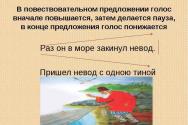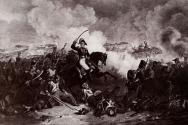Quiz based on the story Notes of a Little Schoolgirl. Presentation for the lesson "Notes of a little schoolgirl"
Slide 1
Slide 2
 Russian writer Lidiya Alekseevna Charskaya Or actress of the Alexandrinsky Theater Lidiya Alekseevna Churilova
Russian writer Lidiya Alekseevna Charskaya Or actress of the Alexandrinsky Theater Lidiya Alekseevna Churilova
Slide 3
 Writer Fyodor Sologub (1863-1927) about Lydia Charskaya: “The popularity of Krylov in Russia and Andersen in Denmark did not reach such tension and ardor. And all this was fully deserved by Charskaya...”
Writer Fyodor Sologub (1863-1927) about Lydia Charskaya: “The popularity of Krylov in Russia and Andersen in Denmark did not reach such tension and ardor. And all this was fully deserved by Charskaya...”
Slide 4
 Birth mystery: Lidia Alekseevna was born in noble family. Her father, Alexey Alexandrovich Voronov, was a military engineer. The date of her birth is still controversial. According to some sources, this is 1878, St. Petersburg, according to others - 1875, the Caucasus. But be that as it may, in the 70s of the 19th century a girl was born who was destined to dominate the minds and feelings of a wide range of readers for more than 20 years.
Birth mystery: Lidia Alekseevna was born in noble family. Her father, Alexey Alexandrovich Voronov, was a military engineer. The date of her birth is still controversial. According to some sources, this is 1878, St. Petersburg, according to others - 1875, the Caucasus. But be that as it may, in the 70s of the 19th century a girl was born who was destined to dominate the minds and feelings of a wide range of readers for more than 20 years.
Slide 5
 Family. Bitter loss The family lived in prosperity, the parents loved their daughter, and everything seemed to be joyful and serene. But little Lida was not born under a lucky star. Soon her mother died. And the girl transferred all her love to her father. This may have helped them both cope with the difficult loss. After all, not only the mother, but also the wife passed away. The two of them spent wonderful evenings. And it seemed to Lida that it would always be like this.
Family. Bitter loss The family lived in prosperity, the parents loved their daughter, and everything seemed to be joyful and serene. But little Lida was not born under a lucky star. Soon her mother died. And the girl transferred all her love to her father. This may have helped them both cope with the difficult loss. After all, not only the mother, but also the wife passed away. The two of them spent wonderful evenings. And it seemed to Lida that it would always be like this.
Slide 6
 Stepmother But one day everything changed. My father got married. A strange woman entered the house. Stepmother. What a cold and soulless word! And how cold and homeless the girl felt in her soul. The relationship with the new owner of the house did not work out so well that Lida ran away from home several times. Then it was decided to take my daughter to St. Petersburg to the Pavlovsk Women's Institute. At that time the family lived in Shlisselburg, this was required military service father. The painful memory of the first meeting with the environment of the institute, which lived according to strict, once and for all established rules, remained in my memory forever. For a lively, impressionable child, the institute seemed like a barracks, a prison in which she now had to live.
Stepmother But one day everything changed. My father got married. A strange woman entered the house. Stepmother. What a cold and soulless word! And how cold and homeless the girl felt in her soul. The relationship with the new owner of the house did not work out so well that Lida ran away from home several times. Then it was decided to take my daughter to St. Petersburg to the Pavlovsk Women's Institute. At that time the family lived in Shlisselburg, this was required military service father. The painful memory of the first meeting with the environment of the institute, which lived according to strict, once and for all established rules, remained in my memory forever. For a lively, impressionable child, the institute seemed like a barracks, a prison in which she now had to live.
Slide 7

Slide 8
 Beginning of creativity The dissimilarity from other children of her age appeared quite early. Already at the age of 10 she wrote poetry, and at the age of 15 she took up the habit of keeping a diary, the entries of which have been partially preserved. By this time she was already aware of her difference from others and was tormented by it. “Why do I experience everything more acutely and painfully than others? Why don’t others have such strange dreams as I have? Why do others live without knowing the terrible emotions that I experience?” – she wrote in her diary.
Beginning of creativity The dissimilarity from other children of her age appeared quite early. Already at the age of 10 she wrote poetry, and at the age of 15 she took up the habit of keeping a diary, the entries of which have been partially preserved. By this time she was already aware of her difference from others and was tormented by it. “Why do I experience everything more acutely and painfully than others? Why don’t others have such strange dreams as I have? Why do others live without knowing the terrible emotions that I experience?” – she wrote in her diary.
Slide 9
 Over the years, Lydia learned to control herself. After finishing the boarding school, she did not return to the family, although she understood her father and forgave him for his second marriage. A temperamental, charming, gray-eyed girl attracted attention. The brilliant officer Boris Churilov was bewitched by her. He proposed to Lydia Alekseevna, and the girl agreed to become his wife. So eighteen-year-old Voronova became Churilova. But the marriage was short-lived, the officer left for his duty station in Siberia, and the young woman with a tiny child in her arms was left alone. What was to be done? Go to your father and stepmother? Live in a family according to the rules established in it? Financially dependent on your father? No, that was not for her. She chose a different path.
Over the years, Lydia learned to control herself. After finishing the boarding school, she did not return to the family, although she understood her father and forgave him for his second marriage. A temperamental, charming, gray-eyed girl attracted attention. The brilliant officer Boris Churilov was bewitched by her. He proposed to Lydia Alekseevna, and the girl agreed to become his wife. So eighteen-year-old Voronova became Churilova. But the marriage was short-lived, the officer left for his duty station in Siberia, and the young woman with a tiny child in her arms was left alone. What was to be done? Go to your father and stepmother? Live in a family according to the rules established in it? Financially dependent on your father? No, that was not for her. She chose a different path.
Slide 10
 Birth of a pseudonym Remaining in St. Petersburg, she entered the Dramatic Courses at the Imperial theater school. Her bright appearance, impulsiveness, and temperament made her noticeable on the course. Even during the entrance exams, teachers noticed this girl, which helped her pass the competition. After graduating from college, Lydia Alekseevna decided to join the Alexandrinsky Imperial Theater, where she served (as they said then) from 1898 to 1924. It was there, on the stage, that the pseudonym “Charskaya” was born.
Birth of a pseudonym Remaining in St. Petersburg, she entered the Dramatic Courses at the Imperial theater school. Her bright appearance, impulsiveness, and temperament made her noticeable on the course. Even during the entrance exams, teachers noticed this girl, which helped her pass the competition. After graduating from college, Lydia Alekseevna decided to join the Alexandrinsky Imperial Theater, where she served (as they said then) from 1898 to 1924. It was there, on the stage, that the pseudonym “Charskaya” was born.
Slide 11
 We do not know what meaning Lidia Alekseevna put into this sonorous word. But we can assume that it was born by analogy with the words “charm,” “charm,” “witchcraft.” As an actress, she was little known.
We do not know what meaning Lidia Alekseevna put into this sonorous word. But we can assume that it was born by analogy with the words “charm,” “charm,” “witchcraft.” As an actress, she was little known.
Slide 12
 The literary life of the famous Charskaya became completely different. In literature. The impetus for literary creativity was the lack of funds. After all, her son was growing up, and there was nowhere to wait for help. And then she tried to write her first work. Literary studies, to Lidia Alekseevna’s surprise, turned out to be easy and enjoyable. And she gave herself entirely to him, although she continued to work in the theater.
The literary life of the famous Charskaya became completely different. In literature. The impetus for literary creativity was the lack of funds. After all, her son was growing up, and there was nowhere to wait for help. And then she tried to write her first work. Literary studies, to Lidia Alekseevna’s surprise, turned out to be easy and enjoyable. And she gave herself entirely to him, although she continued to work in the theater.
Slide 13
 The success of Lydia Charskaya: In 1911, a commission at the Moscow Society for the Propagation of Knowledge reported that middle-aged children read more than other authors: Gogol - 35% Pushkin - 25% Charskaya - 21% Twain - 18% Turgenev - 12%
The success of Lydia Charskaya: In 1911, a commission at the Moscow Society for the Propagation of Knowledge reported that middle-aged children read more than other authors: Gogol - 35% Pushkin - 25% Charskaya - 21% Twain - 18% Turgenev - 12%
Slide 14

Slide 15
 Why was she forgotten? In 1917, with the advent of Soviet power, they stopped publishing it, without forgiving the writer for her noble origin and bourgeois-philistine views. (The fact that the woman lived on her earnings from a young age was forgotten.) From 1925 to 1929, with great difficulty, she managed to publish 4 small books for children under the pseudonym N. Ivanova. Her works were removed from libraries and destroyed.
Why was she forgotten? In 1917, with the advent of Soviet power, they stopped publishing it, without forgiving the writer for her noble origin and bourgeois-philistine views. (The fact that the woman lived on her earnings from a young age was forgotten.) From 1925 to 1929, with great difficulty, she managed to publish 4 small books for children under the pseudonym N. Ivanova. Her works were removed from libraries and destroyed.
Slide 16
 Loneliness There was no longer a favorite activity, grateful readers disappeared somewhere. Life stopped at full speed. But the trials didn't end there. She felt the true collapse and meaninglessness of life when the news arrived about the death of her son Yuri, who fought in the Red Army. A lonely, already middle-aged woman, abandoned by everyone, having no relatives by that time, she left the theater in 1924. A literally miserable life began. And then it was K.I. Chukovsky got her a pension.
Loneliness There was no longer a favorite activity, grateful readers disappeared somewhere. Life stopped at full speed. But the trials didn't end there. She felt the true collapse and meaninglessness of life when the news arrived about the death of her son Yuri, who fought in the Red Army. A lonely, already middle-aged woman, abandoned by everyone, having no relatives by that time, she left the theater in 1924. A literally miserable life began. And then it was K.I. Chukovsky got her a pension.
Slide 17

Slide 18

Slide 19

Slide 20

Slide 21

Slide 22

Slide 23

Slide 24

Slide 25
 "The best human qualities" - themes of books by Lydia Charskaya What did she write about? About kindness, love for one's neighbor, compassion, selflessness, responsiveness. Her heroes are people of different classes. These are the nobles who educate their children in privileged educational institutions; and employees living on remuneration for their labor; and beggars who dream of a piece of bread. But all of them are united by philanthropy, the desire to respond to the pain of others, selflessness - those human qualities, the deficiency of which is especially strongly felt in our time.
"The best human qualities" - themes of books by Lydia Charskaya What did she write about? About kindness, love for one's neighbor, compassion, selflessness, responsiveness. Her heroes are people of different classes. These are the nobles who educate their children in privileged educational institutions; and employees living on remuneration for their labor; and beggars who dream of a piece of bread. But all of them are united by philanthropy, the desire to respond to the pain of others, selflessness - those human qualities, the deficiency of which is especially strongly felt in our time.
Slide 26

Slide 27

Father, Alexey Voronskoy, was a military engineer, colonel. The mother, about whom almost nothing is known, died in childbirth. Lydia was raised by her late mother's sisters. Born on January 19Born on January 19, 18781878 in Tsarskoye Selo.Tsarskoye Selo

Lydia spent 7 years () at the Pavlovsk Pavlovsk Women's Institute in St. Petersburg. Impressions of institute life in St. Petersburg became material for her future books. Already at the age of ten she was composing poetry, and from the age of 15 she kept a diary, the entries in which were partially preserved.

Lidia Alekseevna entered the Drama courses at the Imperial Theater School in St. Petersburg. From 1898 to 1924 - work at the St. Petersburg Alexandria Imperial Theater. Mostly she played minor, episodic roles; they paid little for them, and the young actress, who was raising her son Yuri on her own, was sorely short of money to live on.

Lack of funds pushed Lydia into writing. In 1901, the story “Notes of a Little Schoolgirl,” based on her school diaries, was published. The book was published in the children's magazine "Sincere Word" under the stage name of the aspiring writer L. Charskaya (from "charm", "charm").

In 1911, the commission at the Moscow Society for the Dissemination of Knowledge reported at a congress on librarianship that, according to surveys, middle-aged children read mainly GogolGogol (34%), Pushkin (23%), Charskaya (21%), Pushkin Twain ( 18%), Turgeneva (12%)Turgeneva

The stories were translated into foreign languages. A scholarship was established for high school students named after L. Charskaya. Despite the incredible popularity of Charskaya’s books among young people, many were skeptical about the writer’s work: she was criticized for the monotony of plots, language cliches, and excessive sentimentality.











Verification work. Last name _________________ c) without interest Charskaya L. “Notes of a little schoolgirl” 1. What was the name main character stories? ________________ 2. What city did the orphan girl come to? A) St. Petersburg B) Moscow C) Omsk 3. Who was the first to meet the girl in the house? A) children B) uncle C) aunt D) nanny 4. What were the names of Lena’s cousins? ______________________________________________________________ ______________________________________________________________ 5. What did Lena’s cousins call her when she first came to them? a) mimosa b) upstart c) woodlice 6. How did Lena see her cousins? a) kind and affectionate b) funny and good-natured c) evil and liars 7. What words did governess Matilda Frantsevna introduce to the girl at school? a) beautiful, smart, well-mannered, diligent b) deceitful, rude, pugnacious and disobedient 8. Whom did the head of the gymnasium, Anna Vladimirovna, remind Lena of? a) aunt b) grandmother c) mother 9. How did the girl approach the classroom door? a) bravely b) fearfully Test work. Last name _________________ Charskaya L. “Notes of a Little Schoolgirl” 1. What was the name of the main character of the story? ________________ 2. What city did the orphan girl come to? A) St. Petersburg B) Moscow C) Omsk 3. Who was the first to meet the girl in the house? A) children B) uncle C) aunt D) nanny 4. What were the names of Lena’s cousins? ______________________________________________________________ ______________________________________________________________ 5. What did Lena’s cousins call her when she first came to them? a) mimosa b) upstart c) woodlice 6. How did Lena see her cousins? a) kind and affectionate b) funny and good-natured c) evil and liars 7. What words did governess Matilda Frantsevna introduce to the girl at school? a) beautiful, smart, well-mannered, diligent b) deceitful, rude, pugnacious and disobedient 8. Whom did the head of the gymnasium, Anna Vladimirovna, remind Lena of? a) aunt b) grandmother c) mother
9. How did the girl approach the classroom door? a) bravely b) fearfully c) without interest 10. How did Lena work in class, how did she spell out the words? a) the notebook was very dirty b) correctly and very beautifully c) she wrote the letters with diligence 11. What was Julie’s notebook like? a) there were a lot of mistakes b) there were large and small blots on the sheets c) the work was done neatly 12. How many mistakes did Lena make while dictating at the gymnasium? A) none B) one C) two 13. Why was Julie punished? a) for a D in mathematics b) for a D for the Law of God c) for a score in dictation 14. Who is missing from Georges? A) dog B) parrot C) owl 15. Who actually stole Georges' pet? A) Tolya B) Lena C) Julie 14. Who stood up for Lena when she was ordered to be flogged? A) Aunt Nellie B) Julie C) Tolya 15. What did Tolya treat Lena to? A) chocolate B) candy C) liverwurst 16. Who became Lena’s friend and protector? _____________________________________ 10. How did Lena work in class, how did she write the words? a) the notebook was very dirty b) correctly and very beautifully c) she wrote the letters with diligence 11. What was Julie’s notebook like? a) there were a lot of mistakes b) there were large and small blots on the sheets c) the work was done neatly 12. How many mistakes did Lena make while dictating at the gymnasium? A) none B) one C) two 13. Why was Julie punished? a) for a D in mathematics b) for a D for the Law of God c) for a score in dictation 14. Who is missing from Georges? A) dog B) parrot C) owl 15. Who actually stole Georges' pet? A) Tolya B) Lena
B) Julie 14. Who stood up for Lena when she was ordered to be flogged? A) Aunt Nellie B) Julie C) Tolya 15. What did Tolya treat Lena to? A) chocolate B) candy C) liverwurst 16. Who became Lena’s friend and protector? ____________________________________
General lesson on the work of Lydia Charskaya “Notes of a Little Schoolgirl”
Product test:
- Moscow
– St. Petersburg
–Krasnoyarsk
Product test:
1. In what city does Lena’s uncle live?– St. Petersburg
Product test:
2. What were Lena’s cousins andsister, when did she first come to them?
– Woodlouse
-Mimosa
-Upstart
Product test:
3. What words did you use to introduce the girl?governess Matilda Frantsevna in
school.
- Beautiful, smart, well-mannered,
diligent
- Deceitful, rude, pugnacious and
naughty
Product test:
4. Whom did the boss remind Lena of?gymnasium Anna Vladimirovna?
– Aunt
– Grandmother
– Mom
Product test:
5. How the girl approachedclassroom doors?
– Bravely
- timidly
- No interest
Product test:
6. How Lena worked in class,How did you write the words?
– The notebook was very dirty
- Correct and very beautiful
– I wrote letters with diligence
Product test:
7. What was Julie's notebook like?- There were a lot of mistakes
– The sheets contained large and
small blots
– The work was done carefully
10. Test on the work:
8. Who is missing from Georges?- Dog
- Parrot
- Owl
11. Test on the work:
9. Who really stoleGeorges's pet?
– Tolya
– Lena
– Julie
12. Test on the work:
10. Who stood up for Lena whenDid they want to whip her with rods?
– Tolya
– Georges
– Nina
13. Crossword about the heroes of the story
14.
1. Give the name of the conductor whoaccompanied Lena on a trip to St. Petersburg?
2. Name of the headmistress of the gymnasium?
3. The name of Lena’s uncle, to whom she is going
live?
4. What was the name of Lena’s first teacher?
5. What did Tolya bring to Lena when she was
hungry?
6. What is the governess's nickname?
7. What was the name of Nina’s younger brother?
8. What is the name of Lena's older cousin?
9. What is the name of the governess in your uncle’s family?
What word came out horizontally?








